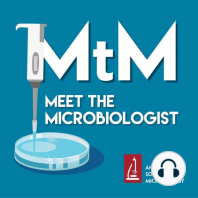16 min listen

MTS22 - David Knipe - Herpes Simplex Virus 2 (HSV-2)
MTS22 - David Knipe - Herpes Simplex Virus 2 (HSV-2)
ratings:
Length:
16 minutes
Released:
Mar 31, 2009
Format:
Podcast episode
Description
David Knipe is the Higgins Professor of Microbiology and Molecular Genetics at Harvard Medical school. A virologist, Dr. Knipe focuses his research efforts on the herpes simplex virus 2 (HSV-2) – the virus we have to thank for genital herpes.
An astonishing 20% of Americans have been infected with HSV-2, and whether they’ve had a recognizable outbreak of sores or not, they can still carry the virus. Once you contract the HSV-2 it lays low in your nerve cells, waiting for the right moment to create watery blisters that eventually burst and release more virus particles. Dr. Knipe is interested in how the cells lead these two, very different lives: quiet and quiescent inside the nerve cell and loud and lytic in the epithelium on the surface of the body.
Genital herpes is no picnic, but the effects of HSV-2 infection are worst in people with depressed immune systems and in newborns; babies who pick up the virus during birth may suffer from neurological damage, brain damage, or even death. There is no cure for genital herpes, and no means of getting rid of HSV-2, only ways of managing outbreaks. But there is some hope of relief; Dr. Knipe’s lab has developed a vaccine that will enter the trial phase soon.
In this interview, I asked Dr. Knipe about how he got interested in viruses, about the vaccine he’s developed and who could hope to benefit from it, and why it’s taken science so long to develop a vaccine for this extremely common disease.
An astonishing 20% of Americans have been infected with HSV-2, and whether they’ve had a recognizable outbreak of sores or not, they can still carry the virus. Once you contract the HSV-2 it lays low in your nerve cells, waiting for the right moment to create watery blisters that eventually burst and release more virus particles. Dr. Knipe is interested in how the cells lead these two, very different lives: quiet and quiescent inside the nerve cell and loud and lytic in the epithelium on the surface of the body.
Genital herpes is no picnic, but the effects of HSV-2 infection are worst in people with depressed immune systems and in newborns; babies who pick up the virus during birth may suffer from neurological damage, brain damage, or even death. There is no cure for genital herpes, and no means of getting rid of HSV-2, only ways of managing outbreaks. But there is some hope of relief; Dr. Knipe’s lab has developed a vaccine that will enter the trial phase soon.
In this interview, I asked Dr. Knipe about how he got interested in viruses, about the vaccine he’s developed and who could hope to benefit from it, and why it’s taken science so long to develop a vaccine for this extremely common disease.
Released:
Mar 31, 2009
Format:
Podcast episode
Titles in the series (100)
MTS13 - Joel Sussman - Proteopedia.org and Intrinsically Unstructured Proteins: Joel Sussman, Ph.D. is a professor of structural biology at the Weizmann Institute of Science in Israel. In his research, Dr. Sussman is interested in elucidating the structures and functions of proteins, particularly those involved in the nervous system. by Meet the Microbiologist